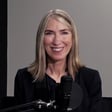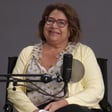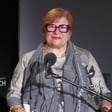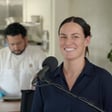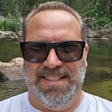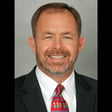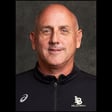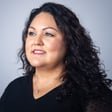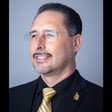Become a Creator today!Start creating today - Share your story with the world!
Start for free
00:00:00
00:00:01

Battleship!
Dan speaks with Mike Getscher '92, the Battleship IOWA’s executive vice president and chief operating officer.
Transcript
Introduction and Setting: USS Iowa's Historical Significance
00:00:16
Speaker
Welcome back to At the Beach, the official podcast of Cal State Long Beach. I'm Dan Montoya, Vice President for University Relations and Development. Today's episode is very special. We are not in the studio, as obvious.
00:00:30
Speaker
We are coming to you from the deck of the historic USS Iowa, also known as the Battleship of Presidents and affectionately nicknamed the Big Stick. docked just across the harbor from Long Beach in San Pedro.
00:00:44
Speaker
She's a proud symbol of American naval history.
Journey of Mike Getcher from CSULB to USS Iowa COO
00:00:48
Speaker
Joining me today is Mike Getcher, the Iowa's Executive Vice President and Chief Operating Officer and a proud CSULB alum.
00:00:58
Speaker
Mike earned his bachelor's degree in mechanical engineering in 1992. Since then, he has an impressive career. He was director of operations at Ice Energy, the director of facilities and life support at Aquarium of the Pacific, and now leads operations here aboard the Iowa.
00:01:16
Speaker
Mike also served as the executive director of the Historic Naval Ships Association and an international international nonprofit that supports museum ships like this one. As a member of the Long Beach community and a Navy veteran himself, I'm thrilled to be here today.
00:01:33
Speaker
Mike, thanks for having us, and welcome to At the Beach. Dan, thanks a lot for having me. It's it's really wonderful to be here. I'm a product of Long Beach. Most people wouldn't know that here, but born and raised there, and every school that I ever went to was in Long Beach from the youngest ah age you can think of all the way up through Cal State. So thrilled to be here and happy to talk.
00:01:51
Speaker
You know, that's not uncommon. I run across a lot of great people in Long Beach that grew up here. They got educated here and they stayed and they contribute to the community in such ah an amazing way. And that's what I love about Long Beach is that you have people who know the history, who've seen it grow and develop. So that's that's pretty awesome. What's fun for me, too, by the way, is that it was known as Iowa by the Sea for many years. Really? Yeah. My dad, actually my mom and dad both came from the Midwest, right next door to Iowa and Omaha. So, yeah yeah, it's kind of fun. And we just saw some people from Iowa come here. That's pretty special. They get in free. Yeah.
00:02:27
Speaker
Okay.
USS Iowa's WWII Contributions and Historical Events
00:02:28
Speaker
So let's start with the USS Iowa's past history. Can you give us a quick overview of the ship's history? Maybe highlight some of its most significant moments during World War II or the Korean War and beyond.
00:02:39
Speaker
First off, I'd say that most people don't understand that the first half of the last century was really the battleship era. right you know Everybody was was vying to build them. ah Entire international treaties were written around battleships because they were so expensive and so threatening.
00:02:52
Speaker
So big deal. This particular ship was designed in the nineteen thirty s you know basically depression era. um and approved under Franklin Delano Roosevelt, the president at the time. Right ah right now, in fact, we have aboard the ship, his great-grandson, Hall Roosevelt, is our director of sales and marketing. So it's really a neat connection.
00:03:11
Speaker
She was first commissioned in 43. And the first thing she did was to do what we call the Tirpitz Watch. The Tirpitz was ah the sister ship to the German battleship Bismarck. So it was kind of a threat.
00:03:23
Speaker
ah So did that for a little while. And then she came back to the coast and then brought FDR and pretty much the entire leadership of you know the the the administration right all the way across to North Africa for the Tehran Conference with Stalin and Churchill.
00:03:38
Speaker
yeah And on the way back, of course, at that conference, they talked about any number of things including post-war and and also what we're we going to do about invasion of of Europe.
00:03:48
Speaker
And so the first D-Day conversations without question occurred aboard this vessel on the way back from from ah North Africa. Following that she served in the Pacific doing the island hopping campaign and then she was the radio ship in about, as I understand it, about a thousand yards away from the USS Missouri where the surrender was actually taking place. so This vessel transmitted the surrender across the airwaves.
00:04:14
Speaker
ah But post-war, she was retired, well i think, 1948 or thereabouts. Of course, the Korean War, she was recommissioned. She spent many months in the gun line with her sister ships and, frankly, fired more rounds during that conflict than during World War two After the war there, she kind of just stuck around training midshipmen, doing these general cruises, ah hosted a lot of ah leadership throughout the the years, and then decommissioned in 58.
00:04:41
Speaker
And then during ah the Reagan era, she was recommissioned in 1984 and served in what I would call the Cold War era. So decommissioned last in 1990. So just an amazing history.
00:04:53
Speaker
She served three eras and and traveled a lot of miles. That's amazing.
USS Iowa as a Cultural and Educational Hub
00:04:57
Speaker
I love how you talk about the ship as a living, breathing thing, because that's what it is, right? You know, for many, many years, there's so many sailors who have come and gone, and she's seen so many amazing things throughout the year. Yeah, we think of it the same way, too. We're the fourth crew, right know and it's on its fourth commission. Yeah.
00:05:14
Speaker
And frankly, this is going to be a very long commissioning. yeah her Her retired service as a museum ship, as a memorial, as really an icon for not just the Navy, but but for the sailors and and all the work that was done.
00:05:27
Speaker
It's an amazing place to work, frankly. Yeah, it's awesome. So the Iowa is clearly a proud fixture here in Long Beach in the San Pedro community. Mm-hmm. How was this ship how has the ship devolved the culture, an educational hub, and what importance do you see it having in the logo local residents and visitors?
00:05:46
Speaker
You know, i think of it this way, you can't really exist in ah in a vacuum. right You just can't. You have to establish social capital, I think is the term. In fact, I give credit to Dr. Schubel, whom I worked for at the aquarium. you know He mentioned that to me once.
00:06:01
Speaker
um So we're really involved in the community. We have all any number of nonprofits who we allow them to to use the space aboard the ship, Alcoholics Anonymous, the Chamber. We have any number of places that that come down and work.
00:06:13
Speaker
But we're also partners with the Port of Los Angeles. We're kind of integrated into port operations. We're co-founders with the Port of LA, all of our friends there, for LA Fleet Week, which is a huge regional event. Just in front of the ship alone, you can see upwards of 50,000 people during that weekend.
00:06:30
Speaker
We also do a tremendous amount of training and it probably wouldn't be seen. In fact, Long Beach Fire Department has been here to do training down inside of our ship. ah We work incredibly closely with um the other law enforcement and first responder groups throughout the region.
00:06:44
Speaker
First name basis with Chief Villanueva at LA Fire Department. First name basis of LA Port Police Chief Gazy, Captain McGuire at the LAPD Harbor Division. We work with them really closely.
00:06:56
Speaker
And then we also are engaged in something that most people wouldn't know about either, which is, it's called DISCA. That's the acronym. You know, there's acronyms throughout our lives here. Yeah, don't Yeah, think. Defense Support of Civil Authorities. So in the event of an earthquake around here, DISCA would be enacted essentially. Right. and And the local community would be able to access some of the um the vessels or the manpower from the ah you know the military region. so There's a lot of partnerships here. We're very tightly engaged with all of that.
00:07:26
Speaker
um Even this last week, we had the soa tsunami alert, and that little system kind of ramped up, and we all talked to each other and made sure that we were going to be safe. and you know it's just It's part of who we are and what we do here. And I don't think people would realize that or or even understand how you play a role in that. So I'm glad you shared that because it's so important because we don't know what earthquakes or what's going to happen far away. But to to be a part of that in that emergency response is amazing.
Community Engagement and Educational Collaborations
00:07:53
Speaker
Yeah.
00:07:53
Speaker
So are there specific collaborations or connections between the USS Iowa and Cal State Long Beach? And have CSULB students, faculty or programs been involved in any educational preservation efforts?
00:08:05
Speaker
So I'm not aware of anything specific as far as a program goes. Certainly without question, we've had CSULB grads here. Certainly I'm one and there's been others as well. yeah A lot of our education efforts in the past have have been really focused on younger folks, you the grade schools and the high schools. And yeah one thing I can share that's still amazing to me having grown up in Long Beach, there are so many kids here in the local region which have never even seen the water. you know So to come down to the ship is an amazing experience for them.
00:08:32
Speaker
We have an overnight program for any kind of youth groups, very organized, of course, up to 200 bunks. And they do a history evening and then, of course, sleep aboard the ship. And there's any number of other events that occur down there as well.
00:08:46
Speaker
ah Another university, USC, has been doing an an annual um and day of service here. So we'd be happy to talk with Cal State about it. Yeah, day of service sounds good to me. Yeah, just ah they bring down 40 or 50 people and we always need help. you know So we're we're all about that. We're 90% volunteer here aboard the ship. That's awesome.
00:09:06
Speaker
So you know talking about Cal State Long Beach, talk talk to us a little bit about your time there. you know and you know so i I had kind of an interesting journey, I guess. I actually went to Long Beach City College first. Okay.
00:09:17
Speaker
Picked up a degree and then went off and and did some work in the diesel mechanics world. But I was kind of disappointed. I wanted more. yeah And I remember thinking as I worked in Gardena one day, what about marine engineering? Not even sure how it came out.
00:09:30
Speaker
Next thing I knew, i was at a friend's house looking at the old catalogs they used to have. They're like an inch thick. yeah yeah It's all in line now. But ah one inch thick thing, and I and i sifted through it. um And they had ocean engineering. They didn't have marine engineering. wow And remember the the teacher was still there. but um Basically, i thought, I want to do that.
00:09:49
Speaker
So um I looked at the catalog, pretty intimidating, yeah and decided to get back to school. right And so I first went to Long Beach City again to catch up on my math and you know pre-calc and calculus and chemistry and all that kind of stuff, and then matriculated up to Cal State.
00:10:05
Speaker
um And ah I was on what I call the seven-year program, two years at Long Beach City and then five years at at Cal State. Yeah. um I did really well initially academically. I was in Pi Tau Sigma, just had a good time, but pretty soon I was working full time too. you know and So very proud of the fact that I put myself through school. yeah um And then one of the major events I think for me up at Cal State was that um they've ah they've owned a research vessel for years.
Career Advice for Aspiring Engineers
00:10:33
Speaker
It's called the ah research vessel Yellowfin. It's still in existence. It's about 2,000 yards over this way. right
00:10:39
Speaker
And they had a job opening. And it at the time, it was operated by ah Dr. Murray and the Ocean Studies Institute. And i ended up going over there, picking up a part-time job on top of the other job.
00:10:51
Speaker
And that was my initial foray into the maritime world and ultimately leading to me obtaining yeah ah an officer's license in the United States Merchant Marine as an engineer.
00:11:03
Speaker
Can you give some advice to an engineering student who's studying engineering or even a student at Cal State Language? Like my son, he's transferring to Cal State Language. going study engineering as well.
00:11:16
Speaker
But a lot of times engineers think it's, ah you know, traditional job, like you you know you go work for some manufacturing company or some, you know but you took a very um interesting direction. And the knowledge that you learned, you know it it enhanced or educated you as a person, but it gave you all the skills to understand naval vessels and everything else. But then you learned so many other things along the way.
00:11:43
Speaker
so Can talk about that? Yeah, i' it's kind of curious. so Originally, I was a mechanic, and then, of course, I went to Cal State. um To me, the engineering program but gave you a foundation. right right I don't use calculus or differential equations now. I remember having kind of a fear of that. I didn't want to just sit in an office somewhere. But it provided that fundamental knowledge on for me, corrosion and and mechanics and structural items. and and just the calculations behind it so you you understand it.
00:12:10
Speaker
And then I ended it up in some ways in almost an engineering management position. Right. You know, and so it's a much different animal. The one thing I would say, you don't really know what your path will be. i mean, to me, it's still a surprise. Yeah.
00:12:22
Speaker
I've got a thousand days of sea time. I would never have guessed that when I was at Cal State Long Beach. But it was very cool. um ah But there's other things to learn out there. um Probably the one or two things that I would say that um you should really focus on once you get out of school or perhaps even in school.
00:12:38
Speaker
Focus on people because that's really the key. You can't get anywhere without having those relationships. Another thing that was perhaps surprise for me was communication. I write all the time.
00:12:50
Speaker
Being able to communicate is something I didn't really learn at Cal State per se, although certainly you have all those opportunities. But for me, it was really about reading as a young person, you know as as a boy and as a young man. I loved reading and it allowed me to develop a little bit of of writing skills.
00:13:04
Speaker
I now communicate to 600 people every week. you know and it's That's the amazing and and perhaps the one surprising thing. So focus on people and learn how to communicate because if you can't communicate your ideas, you can't really, it's hard to get places. Yeah. 100% agree. 100% agree. And everything you said is is what I share with folks, right? It's um the education you get gives you a foundation, teaches you how to think.
00:13:30
Speaker
And you should be able to write and speak and and communicate, network. And sure, all those things you mentioned is so valuable. So I'm so glad you said that. So how can the university interact with the USS Iowa? What are ways that maybe, again, you you talked about a service opportunity, but how else can we interact with you and maybe just build some connections?
00:13:55
Speaker
The amazing thing I think about this place is our volunteer corps. um We see between 50 and 60,000 hours of volunteer time okay every year. um We have volunteers literally in every department, including accounting, IT, certainly in my purview, engineering and operations, ah events, i mean you name it, even communications. During Fleet Week, we had a whole team of people that that worked on that.
00:14:22
Speaker
engaging with us in that way is a huge benefit for everybody. It's just been amazing experience. Challenging at times, too. But but still, we we have to do that here. There's no way to really support that kind of staff. actually um you know where We've always been 90% volunteer, 10% paid staff. So I've been fortunate to be here for coming up on 14 years since I first stepped aboard her.
00:14:44
Speaker
um so ah but But that's probably one of the major ways to do that. So if people wanted to volunteer, how would they go about doing it? On our website, we have links and, or you reach out through you and ah I'll get um in touch with people.
00:14:57
Speaker
and We do have a training program for the basics, you know, safety and so forth. And then we try to align people with their interests. um We have the tour department gives tours. We have people with an engineering background providing engineering tours on weekends, a very extensive, two and a half hour tours, wandering through the ship stem to stern, literally from the anchor windlass room, which is beneath our feet here, all the way back to steering gear. So,
00:15:21
Speaker
um Those are the fun things to do. The engineering slash operations team, we maintain the vessel, we deal with paint, we deal with hull maintenance. ah We have electrical systems, but you really have to understand that it's not something you just do coming off the street.
00:15:35
Speaker
um We have mooring lines that we have to take. Each one of these ah ropes that tie the ship to the dock costs $7,500, you know, and and there's 14 of them and we have to tighten them up once in a while. So There's all kinds of opportunity here to to bring people aboard and engage them and become part of the community, which is really what this is.
00:15:53
Speaker
So um building off of that, you know we we raise money for the university for many different opportunities. And I know to maintain this ship is not cheap.
00:16:05
Speaker
So how can people in the community support you, give philanthropy to support the efforts that you guys are doing? Because I think this is an amazing piece of history because this was a huge naval ah base at one time.
00:16:20
Speaker
And it's also part of the fabric of of what is Long Beach now. and And I want to see it here for years and years to come. So how could people support
Funding and Preservation Challenges of USS Iowa
00:16:28
Speaker
you? Well, first off, I'd like to say there there's a misconception out there. People tend to think or just assume that we're supported by the government in some way. We're not. Right. You know, then the Navy literally gave us the ship. and they have a little hook in the contract says, oh, if we want it back, we'll take it back. Yeah.
00:16:42
Speaker
But they don't provide any money at all. um The state has provided some very specific funding under her grant system for construction on the dock for something. But overall, we support ourselves. As we like to say, eat what we kill.
00:16:55
Speaker
I'd say that roughly 30% of our budget is all from what we call gate proceeds, the gate people coming in. 40% is donation. Of course, we have other things, retail opportunities. We have a hot dog stand back aft.
00:17:07
Speaker
yeah There's other opportunities. But donation is a wonderful way to do that. And we have great links on our website, of course, for that. So um always um we need help. you know We are not ah supported by any form of government. you know the ah Just the power alone here, my electrical bill, not as much as it was at the aquarium, but still pretty significant, upwards $30,000 a month. Oh, wow. We run a business.
00:17:33
Speaker
it It happens to be a nonprofit. As my favorite people that I've learned from in the past said, no margin, no mission. yeah If you can't support the institution, you can't take care of the people and the things that you're trying to get done. yeah So that's the powerful part of it. I think you really have to understand that.
00:17:50
Speaker
Yeah, no, i encourage folks, if you're listening to, you know, come here and visit, but also contribute because, you know, again, it takes a lot of minutes to keep this. But what what we don't understand is this is history here. It's it's a priceless thing.
00:18:08
Speaker
priceless commodity. It's a priceless vessel that you can't put money behind all the things that this ship has been. It's tough. Yeah. yeah and in ah ah you know it's it's It's a challenge to to do things, to maintain her and also keep the original fabric. yeah you know I think, ah in fact, I've written, ah it's almost a 20-page document now just on a different issues surrounding you know ah preservation, yeah the restoration, and the maintenance of it. um It's really, frankly, complex. you know We have a contract with the Navy. We have a lease with the Port of Los Angeles. We have relationships with the LA Fire Department.
00:18:45
Speaker
ah We deal with the State Historic Preservation Office to a degree pretty lightly, um but there's any number of of different jurisdictions that we have to ah address and and deal with. And I like to think about things. This is an artifact. You know, when you think of an artifact as a museum, one of the things that come to mind are two things perhaps that I like to use in my examples are the Mona Lisa, which is in the Louvre, and also the Wright Flyer, which is in Air and Space Museum, I think on the mall still, yeah and back in D.C.,
00:19:11
Speaker
And those are artifacts, and we conserve those artifacts, and we just keep them when we look at them. yep But we don't go flying in the Wright Flyer. We don't hang them on lisa on our or our our door. But if you look at the White House, for example, that's a little bit different. you know Started, I think, in late completed in 1800, burned in 1814.
00:19:30
Speaker
burned once in eighteen fourteen she's not an artifact. You know, back in the 40s, she was pretty much gutted. and There's a great picture of a bulldozer inside the main floor of the White House.
00:19:42
Speaker
And so you're always balancing the needs for the growth and utilization of the ship. You know, we live on this thing and and work on it right um while trying to retain the fabric that we have.
00:19:53
Speaker
And we also have to respect some other, some new technologies. And I'll give you a great example. um Some years ago, we did some research on teak deck. Of course, these ships, as a capital ship in the Navy's parlance, ah it had teak decking, and often three or four inches thick in some areas.
00:20:09
Speaker
Teak is incredibly expensive. And now it's illegal to to cultivate or to cut down in Myanmar, formerly Burma. Really? And there's something known as blood teak, which is exactly what you might think it is, where ah there's violence associated with the procurement of teak. And although there are some other resources for teak for potential restoration of the deck, you know, they're they're rather immature and and they they cause problems. So ah we ended up looking at ah the new products that the the cruise ships are using. It's called Herculon. it's Basically, it's a synthetic teak material.
00:20:45
Speaker
It's a substitute, and it'll keep us going for decades now. And so we transitioned to the newer technology. We retained the appearance, the feel, the look of what we did.
00:20:57
Speaker
But we can't just go and rape and pillage on trees. just i mean, it's It doesn't make any economic sense. Yeah, for sure. Certainly environmental and social. So, you know, we we shifted. um in fact, just to if you before you leave today, take a look at our O1-level deck. We just had a press conference this week, and ok we opened it up and did 5,000 square feet of deck.
00:21:17
Speaker
Very expensive. Yeah, that. You know, three quarters of a million dollars. So, but still, oh that kind of gives you in a nutshell that weird balance we have to do maintaining original fabric, but we have to adapt a little bit too. And so respecting that is really the the core issues.
00:21:33
Speaker
So what's the what's the future future vision of
Future Plans for USS Iowa and Community Integration
00:21:37
Speaker
the ship? I mean, obviously there's going to continue to be an important fabric of Long Beach, but what's what's your vision for but the ship?
00:21:45
Speaker
You know, we want to continue to to grow and maintain what we have, I think. And certainly maintaining the ship is a huge thing. You know, these ships were only meant to to last for 20 or 30 years. and here we are at over 80 now. yeah So, you know, that's always going to be main priority.
00:21:59
Speaker
And we can't easily dry dock this vessel either. So we're always going to be working on on that type of maintenance in the water and so forth. But we'd like to just expand beyond that, you know, the social capital that we have and and become even more integrated and help even more ah throughout the community in every way we can. So it really is about us being a part of the community here. it's it's right I can't imagine doing anything but.
00:22:22
Speaker
Yeah, talk to us about the the signature events that you do here, like Fleet Week. and but When do those happen? and and So Fleet Week is big, probably another large event. We do on the fundraising event in October. It's our gala.
00:22:35
Speaker
um Over the years, there's been any number of things, either here or right in front of us. Cirque Soleil has been out here in the parking lot. Oh, really? Yeah, yeah, has been back. ah Even American Ninja Warrior was out here and filmed, and that's kind of wild.
00:22:48
Speaker
We do a lot of, not a lot, we do quite a bit of filming. We've had any number of things. ah Those are not open to the public, by the way. We've landed a helicopter on the Fantail. yeah um And then we just have the normal range of of ah private and and commercial events throughout.
00:23:02
Speaker
um We have the Iowa by the Sea picnic here every year still. um So it's just ah and what I would call a standard range. Even at the aquarium, we did similar things. I was there for six years. yeah I was there the day we opened, just the day we opened here too. my gosh. But, yeah, I don't know how it all kind of happened that way. but ah So we we do all kinds of things like that. And the TransPAC kickoff party has been here for the last two sessions. It's every other year.
00:23:28
Speaker
um There's always something going on. Keep an eye out on the website. You'll find things. It's really cool. That's good. Do you guys still do... um Exercises with the Navy? So we've done a few things with them, but not too much. It's really more about the first responders locally. ok um We have things called ComRELs, community relations events here sometimes.
00:23:48
Speaker
um Oftentimes the Navy chiefs, prospective chiefs, as they're coming up through the ranks they're going to be anointed as a chief, they'll theyll come out in a group of 20, 30, 40 people and they'll perform service for a weekend.
00:24:01
Speaker
um So we do things like that quite a bit. But again, the Navy doesn't provide money or or things like that. ah But we chat with them. And my boss sometimes heads back to the Pentagon at times. We work with ah Chinfo, okay the chief of ah naval information, which is kind of like their PR yeah side. So and there's a few recruiting things, but ah overall, it's it's not as direct as you might think.
Mike's Career in Nonprofits and Personal Reflections
00:24:24
Speaker
So you've you stayed in in the realm of, ah you know, ships and vessels and merchant marine and so on. what What inspires you to keep doing it?
00:24:35
Speaker
You know, I found probably two things. I want to add value. i This is now my 26th year in nonprofits. Yeah. You know, ah whether it's the Hancock Institute for Marine Studies at USC, the Aquarium of the Pacific in Long Beach was there for six years, 14 years here. You know, adding value and doing something that that to is real yeah is really important to me.
00:24:58
Speaker
And I've just been fascinated by the things I've been involved with. um Ice Energy was green energy. it was thermal storage. Loved it. Six years there. um You know, the aquarium was amazing. Again, there the day we opened in 1998. This thing has been an incredible journey for 14 years for me.
00:25:14
Speaker
So I tend to gravitate towards a little bit of adventure and excitement. I've got a thousand days of sea time. I've bromevered around the world a year in the Mediterranean, a year in the Gulf, and they think two transatlantics, a transpacific, as far west as Guala Canal.
00:25:28
Speaker
I've always been doing something exciting. And, you know, I think that's that's really key to who I am. That's awesome. Well, we're gonna we're going to wrap it up, but I brought a challenge coin that I created for Cal State Long Beach
Conclusion and Acknowledgments
00:25:43
Speaker
for our veterans. So i want to share that with you.
00:25:45
Speaker
Thank you. yeah We want to thank you for hosting us today. um You know, ah Jeff and I were talking about like just getting the community and this is our our first one that we can really come in and and let people know about all the other things that are happening ah in addition to Cal State Long Beach. So we want to thank you and thank your staff for hosting us today. And Also, um I want to give a special shout out Hall Roosevelt, Director of Sales and Marketing, for helping us coordinate all that. And um we really appreciate you.
00:26:13
Speaker
twelve Thank you. very I love being here and talking about it There's a lot of us beach people out here. yeah We're just kind of quiet get things done. so Well, also want to thank my staff, Sully and and Jeff for putting this together.
00:26:25
Speaker
um we we hope you enjoy it. And this has been a treat for us. And come and see the USS Iowa, get to know it and all the great things that it has to offer. And we like to close our podcast with a Go Beach on 3.
00:26:39
Speaker
One, two, three. Go Beach!
